Ave


Kathrin Höckel arbeitet seit ihrer Ausbildung als Historikerin und Ökonomin zu den Themen Bildung und nachhaltige Wirtschaftsentwicklung. Zunächst viele Jahre als Education Policy Analyst und Beraterin von Regierungen bei der OECD in Paris, als Fellow an der Harvard Graduate School of Education und dem MIT GNH & Wellbeing Lab mit Transformationsforscher Otto Scharmer und heute als selbständige Autorin, Regisseurin und Beraterin. Ihr Anliegen ist es, Bildung nicht auf eine Vorbereitung für das effiziente Funktionieren im Arbeitsmarkt zu reduzieren, sondern als umfassende Persönlichkeitsentwicklung und Befähigung zum Engagement zu verstehen. Dazu engagiert sie sich in der universitären Lehre und Weiterbildung von Lehrkräften, berät Organisationen und Unternehmen in Bildungsstrategien und bei der Entwicklung von Instrumenten, um den Fortschritt in diesem Bildungsansatz zu bewerten.
Julian Wildgruber
Julian est le fondateur de l’agence „MadeVision„, expert en communication, cinéaste et formateur en leadership de pleine conscience. Le thème central de son engagement entrepreneurial est de donner aux gens les moyens de rendre la quatrième révolution industrielle plus sociale et écologique. Grâce à des formats d’apprentissage innovants, il soutient les gens pour développer une forme saine d’autogestion générant des actions éthiques et significatives tant au niveau économique que sociétal. De 2012 à 2015 il a réalisé le documentaire cinématographique international „From Business to Being“ qui explore la question de comment vivre et travailler à l’avenir et repenser les entreprises du 21e siècle en vue de garantir au plus grand nombre un avenir digne d’être vécu.
https://www.madevision.com/
Kathrin Hoeckel
Historienne et économiste de formation, Kathrin travaille sur l’éducation depuis la fin de ses études. Pendant 7 ans elle était analyste des politiques éducatives et conseillère de gouvernements à l’OCDE à Paris, puis chercheuse à la Harvard Graduate School of Education et au Laboratoire Bonheur National Brut du MIT avec Otto Scharmer. Aujourd’hui elle est auteure, réalisatrice et consultante indépendante. Sa préoccupation est d’aller au-delà de l’éducation comme préparation efficace au marché du travail pour l’envisager comme source d’épanouissement et d’engagement. Parlant six langues, Kathrin poursuit sa propre formation dans de nombreux endroits du monde : à vélo en solitaire à travers la Russie et l’Amérique, en ski dans le Grand Nord ou à cheval dans les montagnes du Caucase.
Klicken Sie auf den unteren Button, um den Inhalt von www.kathrinhoeckel.com zu laden.
 Contact Press
Contact Press
 Contact Presse
Contact Presse
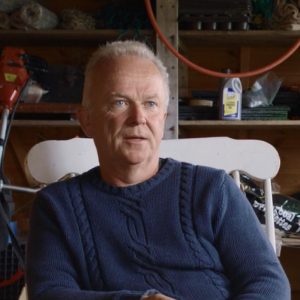
Darrel Leggett – Jardinier d’école
« On se souvient des bonnes choses de la vie. Et cette école cherche à créer de beaux souvenirs pour les enfants. »
Darrel Leggett est un amoureux de la poésie, un autodidacte, un rebelle. Son art est l’horticulture. De vieilles variétés anglaises prospèrent dans son jardin entouré de prairies de fleurs sauvages, il inocule aux arbres des graines de gui, et il est aussi familier avec les vieilles légendes galloises qu’avec toutes les espèces d’oiseaux de l’île. Il a grandi au milieu d’une nature intacte et dans la grande bibliothèque de la maison de ses parents. Il est arrivé à l’agriculture biologique par l’intermédiaire de Patrick Holden, le pionnier de l’agriculture biologique en Grande-Bretagne. Avec son expertise et son enthousiasme, il inspire les enfants à devenir des futurs leaders du changement positif.
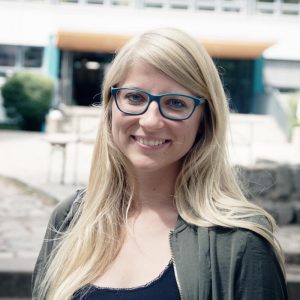
Lisa Viehoff – Enseignante
« Lorsqu’on est connecté à soi-même, les choses fonctionnent mieux. On est aussi plus heureux et plus à l’aise dans ce qu’on fait, quand cela nous touche. »
Enseignante d’anglais et de géographie à l’école protestante Berlin Centre, Lisa termine sa formation pendant le tournage de ce film. En outre, elle s’engage sur le plan social et écologique dans plusieurs organisations. Elle a passé une année bénévole dans une école primaire, s’occupe de familles issues de l’immigration et travaille en tant que secrétaire et gardienne dans un refuge pour animaux. Son intérêt particulier est la pratique de la pleine conscience. Elle a reçu des formations complémentaires en MBSR (Mindfulness-Based Stress Reduction) et en AISCHU (Pleine conscience à l’école) et introduit ces approches dans son enseignement. Elle participe aussi activement au développement de son école innovante.
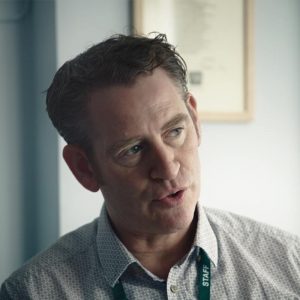
Richard Dunne – Directeur d’école
« Je ne veux pas que les enfants quittent l’école en se sentant déprimés. Je veux qu’ils repartent d’ici en croyant qu’ils peuvent faire la différence. »
Richard Dunne a consacré toute sa vie professionnelle à l’éducation. D’abord comme enseignant, puis comme directeur d’école et aujourd’hui comme conseiller d’écoles, conférencier et auteur, tout en poursuivant un projet de fondation d’une école innovante. Pour lui, les principes d’harmonie de la nature sont le meilleur guide pour l’éducation. Sur cette base, les enfants peuvent apprendre à développer des systèmes adaptatifs et durables dans lesquels la diversité est une valeur et les processus cycliques peuvent être gérés sans gaspillage. Pour lui, le but de l’éducation est de sensibiliser les jeunes à la préservation de la beauté de la création.
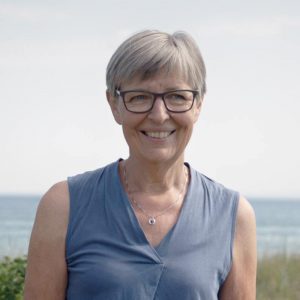
Helle Jensen – Psychologue de famille
« Ne pas savoir ce qui nous attend, c’est aussi une sorte de liberté. Et cela exige beaucoup de responsabilité. »
En tant que psychologue et thérapeute familiale, Helle Jensen a travaillé pendant des années avec le thérapeute familial danois et pionnier de l’éducation moderne Jesper Juul. Pour Helle, la base essentielle du développement de l’enfant est une relation réussie dans laquelle l’adulte est à l’écoute de l’enfant et voit, respecte et encourage sa personnalité. Auteur de nombreux livres (De l’obéissance à la responsabilité, 2019) et fondatrice de projets éducatifs (« Empathie à l’école »), elle travaille aujourd’hui comme consultante pour apporter des compétences relationnelles et de l’empathie dans les écoles.
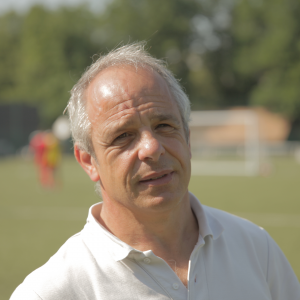
Philippe Bretaud – Entraîneur de football
« Trouver la bonne clé, c’est ce que chaque éducateur doit porter au plus profond de lui-même, pour aider tous ces jeunes à progresser. »
Philippe Bretaud est entraîneur d’équipes de foot junior. À l’Institut National du Football de Clairefontaine, 50 km au sud de Paris, il forme les garçons les plus talentueux de la région. Après s’être vu refuser sa propre carrière de footballeur professionnel en raison de sa petite taille, il a commencé à explorer d’autres voies. Il a appris l’électromécanique et a gravi les échelons jusqu’à la direction de son entreprise avant de revenir à sa passion, le football. En quête d’un développement personnel permanent, il a suivi de nombreux stages de formation continue, a entraîné des équipes féminines et des footballeurs professionnels, et a enfin consacré toutes ses compétences pédagogiques aux adolescents à un âge sensible.

Philippe Bretaud – Football Coach
„Finding the right key is what every educator should carry deep inside themselves, to help all their players grow.”
Philippe Bretaud is a junior football coach at the French National Football Institute in Clairefontaine, 50km South of Paris. He trains the most talented 13 to 15-year-old boys in the region. After being denied his own career as a professional football player because of his height, he started to explore other paths. He learned about electro mechanics and rose to management level in his company before eventually returning to his passion, football. In permanent search for personal development, he has completed numerous training programs, coached women’s teams and professional footballers. Today, he devotes all his pedagogical skills to supporting boys at a sensitive age to live their dream.
Julian Wildgruber
Founder of the change agency „MadeVision“, expert in communication, film director and trainer for Mindful Leadership & MBSR. The core theme of his entrepreneurial commitment is to empower people to make the fourth industrial revolution meaningful on a social and ecological level. Through digital and offline learning formats, he empowers people to develop a healthy form of self-leadership from which ethical and meaningful action in business and society can flow. Between 2012-15 he directed the international cinema documentary „From Business to Being“ which explores the question of how we want to live and work in the future and how companies in the 21st century must be rethought in order to ensure a future worth living.

Helle Jensen – Family Psychologist
„Not knowing what’s coming, there is a kind of freedom in that. It always requires taking responsibility.”
As a psychologist and family therapist, Helle Jensen has worked for years with the Danish family therapist and pioneer of modern education, Jesper Juul. For Helle, the most important basis for child development is a successful relationship in which the adult sees and respects the child’s personality and engages in developing it further. Author of several books (e.g. „Relational competence“) and founder of educational projects („Hand in Hand“, „Empathy in Schools“), she now works as a consultant to bring relationship skills and empathy into schools.

Richard Dunne – Head Teacher
“I don’t want children to leave school feeling depressed. I want them to be going out of this place believing that they can make a difference.”
Richard Dunne has dedicated his entire professional life to education. First as a teacher, then as a school principal and today as a school advisor, lecturer and author with plans for the foundation of a new school. For him, the harmony principles of nature are the best guide for education. Based on them, children can learn how to develop adaptive, sustainable systems in which diversity is a value and cyclical processes can be managed without generating waste. For him, the goal of education is to make young people aware of the importance of preserving the beauty of creation.

Lisa Viehoff – Teacher
„When you are connected to yourself, things work much better. You are happier and more comfortable with the things you do, because you only do what’s important to you.”
Lisa completed her training as teacher of English and Geography at the Protestant School Central Berlin during our shooting. She is socially and ecologically engaged, spent a voluntary social year at a primary school, helps Syrian families to integrate in Germany and serves as a secretary and keeper at an animal shelter. Her special interest is the practice of mindfulness. She took courses in MBSR (Mindfulness-Based Stress Reduction) and AISCHU (Mindfulness in School) and now introduces these approaches in her teaching. She is also actively involved in the further development of her innovative school.

Darrel Leggett – School Gardener
“You remember the really good things in your life. And this school is about creating beautiful memories for children.”
Darrel Leggett is a lover of poetry, an autodidact, and a rebel. His art is gardening. Old English varieties thrive in his garden surrounded by wildflower meadows. He inoculates trees with mistletoe seeds and is as familiar with the old Welsh legends as he is with all the bird species on the island. He grew up surrounded by untouched nature and the large library of his parents‘ house. He came to organic agriculture through Patrick Holden, the pioneer of organic farming in Great Britain. By facilitating direct experiences in nature and thanks to his own enthusiasm, he inspires children to become future leaders of the sustainability movement.
Kathrin Höckel
With a university background in history, political science and economy, Kathrin has been working in the field of education. She spent 7 years as an education policy analyst and government advisor at the OECD in Paris, was a fellow at Harvard Graduate School of Education and also a member of the MIT GNH & Wellbeing Lab led by Otto Scharmer. Today she advocates education as a school of attitude and character and advises policy makers and organisations on how to utilise learning for personality development. A keen sportswoman and adventurer fluent in six languages, Kathrin continues to further her education by travelling around the world, during solo bike trips across America and Russia, unsupported ski expeditions in the Arctic and running on mountain trails.
https://www.kathrinhoeckel.com
 Kontakt Presse
Kontakt Presse
Julian Wildgruber ist Gründer der Change-Agentur „MadeVision”, Experte für Kommunikation, Regisseur und Trainer für Mindful Leadership & MBSR. Das Kernthema seines unternehmerischen Engagements ist es, Menschen zu befähigen, die vierte industrielle Revolution sozial und ökologisch sinnvoll zu gestalten. Durch digitale und offline Lernformate, befähigt er Menschen, eine gesunde Form der Selbststeuerung zu entwickeln, aus der heraus ein ethisches und sinnorientiertes Handeln in Wirtschaft und Gesellschaft erfolgt. 2012-15 realisierte er den internationalen Kinodokumentarfilm “From Business to Being”, welcher der Frage nachgeht, wie wir in Zukunft leben und arbeiten wollen und wie Unternehmen im 21. Jahrhundert neu gedacht werden müssen, um eine Lebenswerte Zukunft zu gewährleisten.
 Darrel Leggett – Schulgärtner
Darrel Leggett – Schulgärtner„Man erinnert sich an die schönen Dinge im Leben. In dieser Schule geht es darum, den Kindern gute Erinnerungen zu hinterlassen.“
Darrel Leggett ist ein Liebhaber der Poesie, ein Autodidakt, ein Rebell. Seine Kunst ist der Gartenbau. Alte englische Sorten gedeihen in seinem Garten umgeben von Wildblumenwiesen, Bäume impft er mit Mistelsamen und die alten walisischen Sagen sind ihm ebenso geläufig wie jegliche Vogelarten der Insel. Aufgewachsen umgeben von unberührter Natur und der großen Bibliothek seines Elternhauses, kam er durch Patrick Holden, den Pionier des organic farming in Großbritannien, zur Biolandwirtschaft. Durch direkte Erfahrung und viel eigene Begeisterung bringt er Kinder dazu, zu Anführern der Nachhaltigkeitsbewegung zu werden.
 Lisa Viehoff – Lehrerin
Lisa Viehoff – Lehrerin„Wenn man wirklich bei sich ist, dann klappen die Dinge viel besser. Dann ist man glücklicher und fühlt sich wohler, denn man macht nur das, was einem wirklich wichtig ist.”
Als Lehrerin für Englisch und Geografie an der Evangelischen Schule Berlin Zentrum schloss Lisa während unserer Dreharbeiten ihr Referendariat ab. Nebenbei engagiert sie sich sozial und ökologisch in mehreren Organisationen. Sie verbrachte ein freiwilliges soziales Jahr an einer Grundschule, betreut ehrenamtlich syrische Familien, hilft als Sekretärin und Tierpflegerin bei „Hauptstadtpfoten Berlin“. Ihr besonderes Interesse gilt der Achtsamkeitspraxis. Sie hat sich in MBSR (Mindfulness-Based Stress Reduction) und AISCHU (Achtsamkeit in der Schule) weiterbilden lassen. Inzwischen führt sie selber diese Ansätze in ihrem Unterricht ein und beteiligt sich aktiv an der Weiterentwicklung ihrer innovativen Schule.
 Richard Dunne – Schulleiter
Richard Dunne – Schulleiter„Ich möchte nicht, dass Kinder deprimiert von der Schule gehen. Sie sollen sie in dem Glauben verlassen, dass sie etwas bewirken können.“
Richard Dunne hat sein gesamtes Berufsleben der Bildung gewidmet. Erst als Lehrer, dann als Schulleiter und heute als Schulentwickler, Vortragsredner und Autor mit Plänen für die Gründung einer neuen Schule. Die Harmonieprinzipien der Natur sind für ihn der beste Leitfaden für die Bildung. Ausgehend von ihnen können Kinder lernen, wie adaptive, nachhaltige Systeme entwickelt werden, in denen Vielfalt ein Wert ist und zyklische Prozesse ohne Verschwendung auskommen. Das Ziel der Bildung ist für ihn, junge Menschen dafür zu sensibilisieren, die Schönheit der Schöpfung zu bewahren.
 Helle Jensen – Familienpsychologin
Helle Jensen – Familienpsychologin„Nicht zu wissen, was kommt, ist auch eine Art von Freiheit. Und das braucht immer viel Verantwortung.”
Als Psychologin und Familientherapeutin hat Helle Jensen jahrelang zusammen mit dem dänischen Familientherapeuten und Vordenker moderner Erziehung Jesper Juul gearbeitet. Für Helle ist die wichtigste Grundlage für kindliche Entwicklung eine gelungene Beziehung, bei der der Erwachsene auf das Kind eingeht und dessen Persönlichkeit sieht, achtet und fördert. Autorin zahlreicher Bücher („Von Gehorsam zur Verantwortung“, „Hellwach und ganz bei sich“) und Gründerin von Bildungsprojekten („Hand in Hand“, „Empathie macht Schule“) arbeitet sie heute als Beraterin daran, Beziehungskompetenzen und Empathie in Schulen zu bringen.
 Philippe Bretaud
Philippe Bretaud„Den richtigen Schlüssel zu finden, dass muss jeder Pädagoge in sich haben, um jeden seiner Spieler zu fördern.“
Philippe Bretaud ist Trainer im französischen Nachwuchsfußball. Im Institut National du Football Clairefontaine, 50km südlich von Paris, bildet er die begabtesten 13- bis 15-jährigen Jungen der Region aus. Nachdem ihm seine eigene Karriere als Profifußballer auf Grund seiner kleinen Körpergröße verwehrt wurde, schlug er erst andere Pfade ein. Er lernte Elektromechanik und stieg in seiner Firma bis in die Managementebene auf, bevor er sich wieder seiner Leidenschaft, dem Fußball zuwandte. Als ein Suchender in permanenter eigener Entwicklung hat er zahllose Fortbildungen absolviert, Frauenmannschaften und Profifußballer trainiert, um dann schließlich sein ganzes pädagogisches Können Jungen in einem sensiblen Alter zu widmen.
